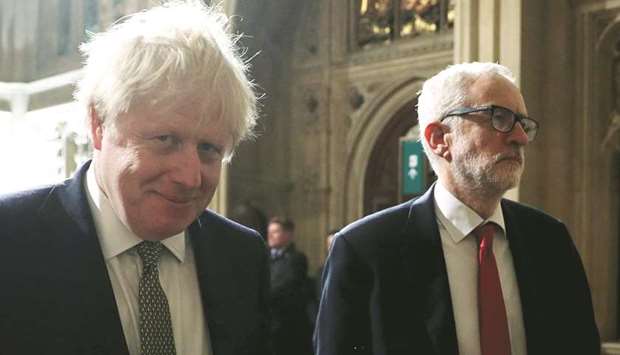Boris Johnson unveiled what he called a radical government agenda
yesterday, setting his sights on a quick Brexit, future trade deals and
on transforming Britain to repay the trust of voters who handed him a
landslide election victory.
Just a week after he won the largest Conservative majority since
Margaret Thatcher in 1987, the Queen’s Speech offers details of
Johnson’s plans for Britain after more than three years of Brexit
upheaval.
Johnson showed he intended to try to satisfy the demands of voters in
northern and central England who broke their tradition of backing the
opposition Labour Party to support him.
Among pledges to boost funding for the state health service, increase
sentences for violent crime and enhance workers’ rights, Johnson made
his campaign slogan to “get Brexit done” his number one priority,
confirming he would lead Britain out of the European Union on January
31.
He said he would not allow any more “dither and delay”, ruling out any
extension beyond 2020 to the transition period to negotiate a free trade
deal with the EU, and suggesting he would hold trade talks with other
countries at the same time.
“Our first task is to get Brexit done and we will leave the EU at the
end of January,” Johnson said in the foreword to the Queen’s Speech,
when Queen Elizabeth sets out her government’s programme at the
beginning of a new parliament.
“We will release the country from the stranglehold of indecision,
restoring confidence to people and businesses. We will avoid the trap of
further dither and delay – by ruling out any extension to the
implementation period beyond 2020.”
Today he plans to begin the process of passing legislation needed to
ratify Britain’s EU exit on January 31, after which date the government
department specially created to oversee Brexit will be closed.
Calling his government’s programme the “most radical Queen’s Speech in a
generation”, Johnson outlined plans to overturn the economic austerity
the Conservative Party has overseen for the last nine years.
He promised to spend more on Britain’s much-loved but struggling
National Health Service (NHS) by passing legislation to guarantee
funding increases, rising to an extra £33.9bn per year by 2023-24.
He also promised better education, better infrastructure and better
technology, and pledged a review of Britain’s security, defence and
foreign policy in the “most radical reassessment of our place in the
world since the end of the Cold War”.
John McDonnell, Labour’s finance policy chief, said the government’s
agenda offered “nothing new ... for our NHS and public services or
people struggling this Christmas”, describing the government as “out of
touch”.
But with a majority of 80 in parliament, Johnson is pretty much assured
of getting his programme passed by the House of Commons, allowing him
almost free reign to set the agenda.
And he even suggested he could win another term at an election due in
2024: “Just imagine where this country could be in 10 years’ time.”
On Tuesday, Johnson told his top team of ministers that they “ain’t seen
nothing yet folks”, warning them that there was much to do to pay back
the trust offered his government in the election on December 12.
After more than three years of debate over Brexit, Johnson wants to move
quickly to try to unite a country divided by disagreements over how,
when or whether Britain should leave the EU.
His aides say he is also determined to try to keep the support of those
voters in northern and central England, many of whom voted Conservative
for the first time, by trying to make their lives better.

Johnson and Labour Party leader Jeremy Corbyn process through the Peers Lobby to listen to the Queen’s Speech during the State Opening of Parliament at the Houses of Parliament in London.
